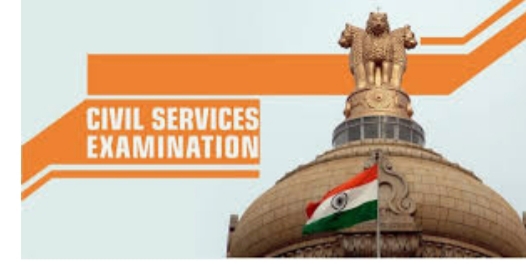Category: Business Blog
BOOKS COULD CHANGE YOUR LIFE
Can a book change our life?
Sure it does. But this depends on what do we mean by “change”. Just simply reading a book can do nothing to you. You can change your life after reading a book only when you apply to learn from the book to your daily life.
Books, especially the good ones, have the power. If you let them, they can change your life in no time, be your guide, serve you and lift you when you need it the most. It’s not wrong when books are often called men’s best friends.
Reading is an efficient means for acquiring knowledge. Knowledge is firmly essential for any human being who looks to exist rather than to live. Knowledge is the main requirement of existence. Without deep and established knowledge, our life would be puzzled, our decision-making ability challenged, even at its lowest level. Lacking knowledge affects our existence as the feeling of loss and perplexity becomes the main driver of our life, especially in such a complex world.
The transformational power of literature has helped start businesses, reveal career paths, build companies, explore the unknown, rediscover purpose, broaden minds, and even save lives.
Reading books lets them acquire a wide range of skills that also make them stand out on the work floor. Skills that you can develop or reinforce by reading are indeed you can even improve by reading to a greater extent than by other activities such as thinking in scenarios. In modern society, this is important for the bonds and connections between people, getting to know other worlds, wanting to understand others, wanting encounters and contacts.
In short, reading leads to contentment in a direct way: it offers positive experiences.
Books are our Best Friends- No Complaints, No Demands

10 Books To Read If You Want To Become A Billionaire
Which are the must-read books for being a billionaire?
Good Question. Although being a billionaire certainly will take a lot more than just reading books. You can still be a billionaire even if you have never picked up a book in your life but have generated an idea that can revolutionize a whole industry. But, the importance of reading should never be underestimated because it opens your mind and exposes you to so many ideas and possibilities that you might remain ignorant about otherwise. So, let’s start. Here are some books you might find interesting:
1. Think and Grow Rich by Napoleon Hill:
In every chapter of this book, mention has been made of the mon making secret which has made fortunes for hundreds of exceedingly wealthy men whom I have carefully analyzed over a long period of years. The secret was brought to my attention by Andrew Carnegie, more than half a century ago. The canny, loveable old Scotsman carelessly tossed it into my mind when I was but a boy… When he saw that I had grasped the idea, he asked if I would be willing to spend twenty years or more preparing myself to take it to the world.I aid I would, and with Mr. Carnegie’s cooperation, I have kept my promise.
2. Rich Dad Poor Dad by Robert Kiyosaki:
Why the rich grow richer and the poor grow poorer. Understand the practical how-to of money-making. Reading Rich Dad, Poor Dad is an amazing investment of time. You get more returns than your investment the moment you start devouring page after page of this book. For the beginners who desire to achieve economic prosperity, Kiyosaki offers workable insights based on real-life experiences. It teaches us ideas about applied economics that should have been taught to us in schools or at home. The principles of financial literacy- Accounting, Investing, Understanding markets and relevant laws are explained in a way that even a layman can fully relate to them. The author emphasizes the importance of sound finances for a better meaningful life.
3. The Intelligent Investor by Benjamin Graham
Never keep your money idle. Let your money make more money. Banks are a waste of time. The 15-year-old, who wants to learn more about stocks and start practicing, the 46-year-old, who’s lost a few sums here and there when experimenting with different stocks and options, but has never consistently stuck with great companies and anyone who likes Warren Buffet.
4. How to Win Friends and Influence People by Dale Carnegie:
In today’s day and age, if you want to earn money, you have to understand people. Money is your payment that is proportionate to the value of service you can provide.
5. The Richest Man in Babylon
A perfect guide to understanding finances and a powerhouse of time-tested principles to gain and retain personal wealth, The Richest Man in Babylon has been inspiring readers for generations. It continues to remain a classic bestseller.
6. The Power of Habit by Charles Duhigg
Why you do what you do. Realize the power habit has over your life and uses it to tweak your brain so that you become more productive.
7.The 48 Laws of Power by Robert Greene
The bare politically incorrect book of what “power” is and how to acquire it.

8.The Bhagavad Gita
The book of all answers. The first success manual ever compiled. Understand this book and
you will never be poor with regards to anything in your life.

9.The Secret by Rhonda Byrne
Rhonda Byrne is the creator behind The Secret, a documentary film that swept the world in 2006, changing millions of lives and igniting a global movement. Later that same year, Rhonda’s book of The Secret was released. It has been translated into more than fifty languages and remains one of the longest-running bestsellers of this century. Rhonda has written three more bestselling books: The Power in 2010, The Magic in 2012, and Hero in 2013.
- 10 How to Be Rich by J.Paul Getty
- Jean-Paul Getty, widely known as J. Paul Getty, was an American industrialist who amassed a fortune acquiring oil companies through often ingenious stock takeovers. He was named the richest living American in 1957 and was worth more than $6 billion (approximately $24.42 billion in 2019) when he died in 1976. In How to be Be Rich, which was first published in 1965, Getty discloses the secrets to his success and provides a blueprint for those who seek to follow in his footsteps. Getty, who was infamously frugal despite being one of the richest men in the world, also delves into the issues of what to do with your wealth once you accrue it. His insights on how to invest in the stock market are still useful today, as are his many practical tips on business fundamentals.
UPSC preparation strategy & book list from zero level
UPSC preparation
I am going to brief you about some of the most important things that you should know before starting with the preparations:
*Read the notification: UPSC releases the notification in february that marks the official of the exam calendar. usually, the dates of the exam(prelims) is released a year before in the interest of candidates, but the final dates are released in the notification covers include eligibility, syllabus of prelims and mains, and the number of vacancies and exam pattern in addition to the exam timelines.
*Print a copy of the syllabus: Next, you should print a copy of the syllabus(from the notification) and keep it on your study table. At this point, sit down and read the syllabus end to end for all subjects. The syllabus of prelims is mentioned very briefly, hence move to the syllabus of the mains to get a complete picture of the syllabus. Additionally, you can download a list of micro topics that experts from various test-prep institutions have put up online and keep it with yourself.
*Previous year papers: you can download them from the official website of UPSC or get a book from Disha publications/Arihant or just browse online. I’d suggest, read at least five times and try to realize demand of upsc. However at this point, we are reading the previous year’s papers just to get a hang of what kind of questions are asked in the prelims and Mains.
*Make study plans: Prepare a robust strategy and come up with your own strategy to cover the syllabus of the exams in order to solve the type of questions that are asked in the paper. Your aim should be to make yourself informed enough to answer at least 70% of the questions asked in prelims and Mains. It is because, if you look at the cutoffs, it is always less than 70% in most cases. So, prepare a monthly, weekly and daily plan wherein you should keep your weekends free for revision.
Once, the above four steps are done, it’s time you should actually begin your preparations:
*Start with NCERTs: There is really no alternative to it you have to read class 6th to 12th selective ncert.
*Standard Books: There are some standard books that are recommended for each subject. Go for reading them after you’ve covered NCERT of that subject. NCERTs serve as a foundation, while these books take you from beginner to advanced level. watch the youtube videos wherever you get stuck, you will surely get some free videos online.
1.Polity -Laxmikant.
2.Economy -Ramesh Singh +Marunal Video Lecture.
3.History -Spectrum , Bipin chandra .
4.Art and Culture – Nitin Singhania.
5.Environment – Shankar Ias .
6.Science– NCERT books class 6th to10th and 12th Biology.
7.Geography– Certificate Physical & Human Geography by Goh leong
*Revision: Revision is extremely important for this exam. make sure you revise all the topics at least thrice before you sit for prelims and one more time before you sit for mains.
*Test series: Mostly ignored yet extremely important aspect of preparation. it is extremely important to keep a tab on your preparation and the mock tests are the only way to give you a reality check from time to time. Do not take the score to the heart or get disturbed by the score initially. work on improving it.
*Mains Answer-writing practice: Do not begin with answer-writing initially, gather some knowledge first, then go about practicing answer-writing.And get it evaluated from your mentor or study group.
*Optional selection: The choice of optional is yet another area of confusion. I’d suggest you choose the subject that you’ve studied in graduation, but if you want to go for some other optional paper, just be sure of that, go through the syllabus and previous year papers to understand it.
I hope i have covered almost all the introductory steps for starting UPSC preparation.
Thank you so much
Makaut Organizer
-
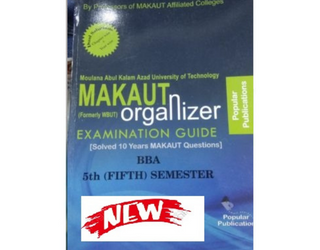 BBA 5TH SEMESTER MAKAUT ORGANIZER- 2019
BBA 5TH SEMESTER MAKAUT ORGANIZER- 2019
₹580.00Original price was: ₹580.00.₹425.00Current price is: ₹425.00. -
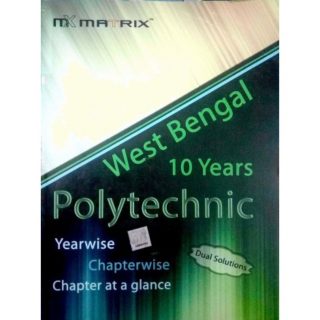 2nd Semester MATRIX (Polytechnic) Organizer 2024
2nd Semester MATRIX (Polytechnic) Organizer 2024
₹730.00Original price was: ₹730.00.₹549.00Current price is: ₹549.00. -
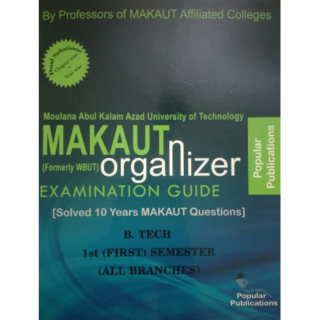 B-TECH 1ST SEMESTER MAKAUT ORGANIZER 2022
B-TECH 1ST SEMESTER MAKAUT ORGANIZER 2022
₹800.00Original price was: ₹800.00.₹599.00Current price is: ₹599.00. -
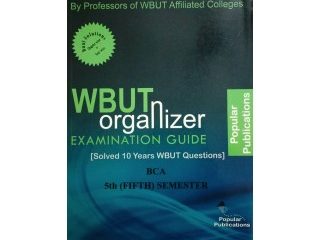 BCA 5TH SEMESTER MAKAUT ORGANIZER
BCA 5TH SEMESTER MAKAUT ORGANIZER
₹500.00Original price was: ₹500.00.₹390.00Current price is: ₹390.00. -
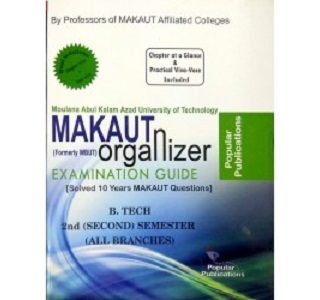 B-Tech 2nd Semester Makaut Organizer- 2024
B-Tech 2nd Semester Makaut Organizer- 2024
₹790.00Original price was: ₹790.00.₹549.00Current price is: ₹549.00. -
 BBA 4TH SEMESTER MAKAUT ORGANIZER-2019
BBA 4TH SEMESTER MAKAUT ORGANIZER-2019
₹530.00Original price was: ₹530.00.₹399.00Current price is: ₹399.00. -
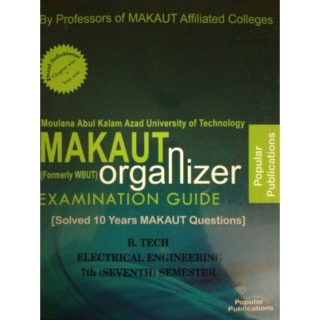 B-TECH EE 7th SEMESTER MAKAUT ORGANIZER-2019
B-TECH EE 7th SEMESTER MAKAUT ORGANIZER-2019
₹640.00Original price was: ₹640.00.₹390.00Current price is: ₹390.00.










